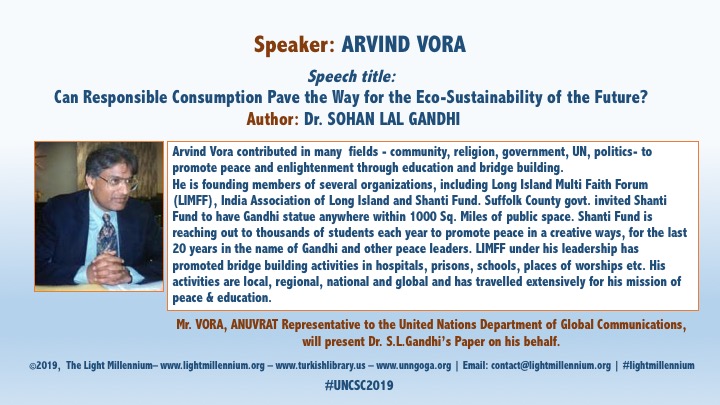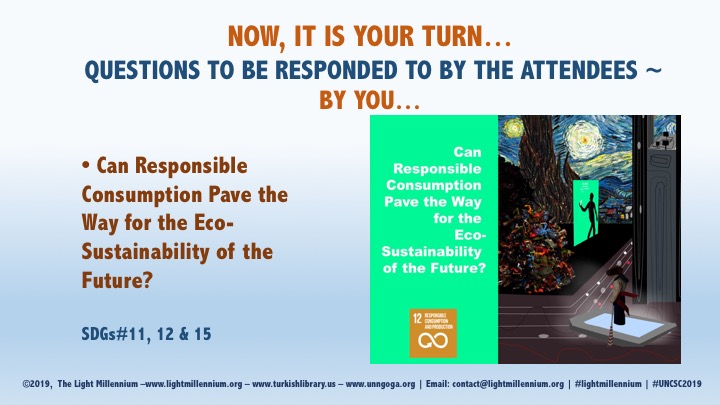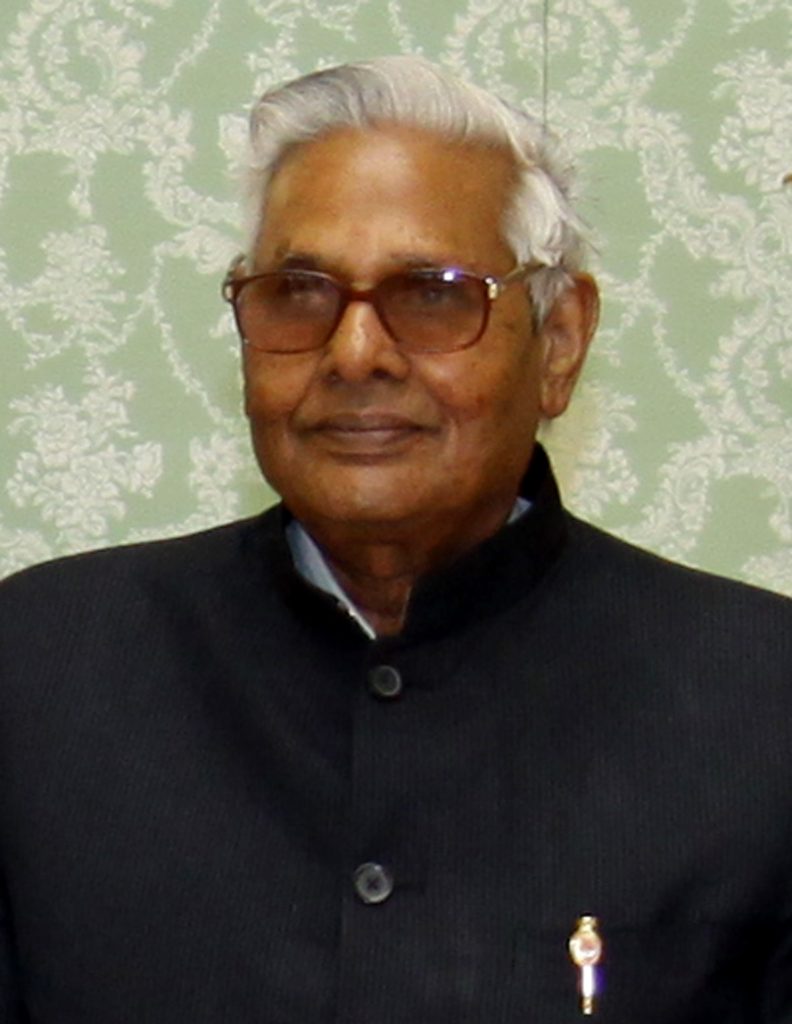Below paper written by Dr. Sohan Lal GANDHI, International President, Anuvrat Global Organization, associated with the United Nations Department of Global Communications.
Presented by: Arvind VORA, Representative of Anuvrat Global Organization to the United Nations Department of Global Communications; at the following titled Workshop, “Great Goals, Unintended Consequences: How to handle the complexity of our technology, and make true progress for our social and environmental well being,” which was led by The Light Millennium Organization as part of
The 68th United Nations Civil Society Conference,
Salt Lake City, Utah
On August 26 – 28, 2019
Workshop Date: Wednesday, August 28
Venue: Salt Lake City Palace
Room# 151 DEF
Time: 10:00 – 11:15 a.m.
• RUN-DOWN and Welcoming • PHOTO Albumof the Workshop |
• BOOKLET with Bios (Abstract included) | • FLYER • MEDIA Release (Updated on August 19, 2019)

CAN RESPONSIBLE CONSUMPTION PAVE THE WAY FOR THE
ECO-SUSTAINABILITY OF THE FUTURE?
Human desire is endless. It has no limits. Before the advent of science man’s needs were limited and so were his desires which were restricted to fulfiling his basic needs. But the advent of science has changed the face of the planet radically. Its multitudinous inventions are instrumental in the production of innumerable varieties of consumable and non-consumable goods. When a person sees them he or she feels tempted and longs for amassing them. Ostentation has become the hallmark of society. The more a person possesses things the more he is respected. It has given rise to greed and uncontrolled consumerism in society. The whole world is swept away by this gale of hedonistic culture. As a result resources on the planet earth have begun to deplete at a terrific speed and sadly in the words of the noted scientist James Lovelock ‘Gaia – the Mother Earth, is now critically ill. It lies denuded of its flora and fauna.’ The truth is that we are on the brink of an ecological disaster and an unprecedented crisis of sustainability looms large.
As we move ahead in the twenty first century the questions that agitate our minds today are : how long will the present civilization last? Will it survive into the third millennium? Will the people sacrifice some of their comforts and behave responsibly towards the needs of the future generations? The answers to these questions can be expressed in just one sentence – it depends on our attitude towards the needs of the future generations and life will survive only if we want.

Scientists say that the age of the earth is 4.6 billion years and life began on it 3.5 billion years ago. The research based on the discovery of human skulls reveals that the early modern human population emerged sixty thousand years ago. In mid 1994 the world population was 5.7 billion which increased at the rate of 8.6 million per year. 200 years ago the total human population was just one billion. In a span of 200 years it has become 7.6 billion.
What I want to emphasize here is that the earth’s eco-system was intact till the end of the 18th century. Humans had limited needs, hence there were a very few industries and the growth of scientific technology was still in a state of infancy. As a result the natural resources of the planet didn’t deplete. The earth’s carrying capacity compensated the limited loss. Industries increased with the increase in the needs of man. The invention of steam engine created an industrial revolution in the 18th century. It changed the lifestyle of the people in Europe. People’s greed for more wealth and desire for physical comforts, for looking smart and beautiful increased manifold. With the passage of time scientific and technological advancement has changed the shape of the world. Steam energy has been replaced by fossil fuel in the form of coal and petrol. Man’s movement out of his house locally and into the wide world has escalated at a terrific speed. The advent of cars, electricity, electric bulb, airplanes, electric trains, landline phones and mobile phones have reduced the world into a small village. The west flourished and the east lagged far behind as regards roads, railways, airports and industries. With the arrival of the beautifully finished goods from the west local small industries lost their relevance. The environmental and ecological degradation that began in the west has percolated into the far east. In quest for wealth, ostentation and political power they could even resort to immoral practices and treachery. The unrestrained lifestyle of the people of the planet has resulted in the rapid loss of natural resources. Excessive emissions of greenhouse gases on account of directionless development has created many holes in the protective shield of humanity called ozone layers. Population explosion from mere one billion two centuries ago to 7.6 billion today has created an unprecedented crisis of sustainability. The destruction of the most forests, disappearance of important species, drying up of rivers, rocky and barren mountains coupled with pollution have made the problem most complicated.
The irony is that the western countries are already developed. They have used up most of our fossil fuel and are living luxurious lives. They emit the largest amount of greenhouse gases and consume 85% resources of the planet. They are not ready to part with their comforts, on the contrary the people in Asia are still struggling for development and many of them are suffering from the excruciating pangs of poverty.
The United Nations has convened many summits to solve the problem but has not yet succeeded. However, some sane voices are being heard. The right thinking people across the world have begun to think of the ways to save for the future generations. The gap between the rich and the poor has widened considerably. Global warming, an apparent consequence of environmental and ecological degradation, is resulting in climate change.
It is true that we cannot survive without consumption but irresponsible consumption and production has turned into an epidemic at global level which needs to be curbed immediately. United Nations Organization is deeply concerned about this crisis and has laid down 17 goals of sustainable development which aim at eliminating poverty, hunger, diseases, gender inequality, unemployment, disparity, atrocities and injustice and ensure good health, quality education, clean water, good infrastructure, climate action survival of bio-diversity and sustainability of cities. As I read the goals set by UN for a better future I find that Lord Mahavira foresaw the bleak future of humanity 2600 years ago and laid down a framework in the form of an ethical code for his votaries for a sustainable future. Most Jains across the world today are already living an ecology friendly lifestyle which does the least harm to the mother earth. They limit their items of eating, clothes, consumption of water and share their resources to help the need. The fulfilment of the objectives of SDGs depends on member-states for the accomplishment of these goals but governments alone cannot handle this ticklish problem since it concerns individual lifestyle. It’s a social problem which cannot be eradicated solely by Govt. efforts. We need an independent global campaign for responsible consumption encouraging people to pledge themselves to reduce their consumable and non-consumable items of daily use. It alone can pave the way for the eco-sustainability of the future.
Though all religious traditions emphasize restraint in consumption, I find Lord Mahavira’s twelvefold ethical code of conduct which he had laid down for the spiritual discipline of his laypersons superb and unique from all points of view. Since he was omniscient (kevali) he could foresee the crisis of sustainability and global warming. He had predicted that on account of man’s wanton behaviour human life would be full of suffering. Apart from shortages of essential commodities the destruction of ecosystem would send the temperature soaring. Most rivers of world would dry and only big rivers such as the Ganges would have some water. His transcendental knowledge also enabled him to see that water fire, earth, air etc. were full of innumerable invisible life forms. Every life form is important so no life form including microbes, insects, germs should be destroyed. They are all a part of our eco-system. His two principles known as ahimsa and aparigraha ensure the eco-sustainability of the future.
It is difficult for a householder to refrain from violence totally but he should at least avoid intentional and deliberate violence and take a vow that he would abstain from inessential violence. It is the first anuvrat. Similarly it is not possible for him to practise truth in its entirety but he should at least take a small vow of truthfulness to avoid false statements. It is his second anuvrat. The third small vow that he had prescribed for a householder is to refrain from taking anything without the permission of its owner. The fourth small vow enjoins a householder to desist from illicit sexual activity. One shouldn’t have sex with anyone other than one’s spouse. The fifth small vow enjoins the householder to voluntarily limit his possessions, including wealth, houses, animals, land and so on. I am astonished at Lord Mahavira’s wisdom. He had foreseen the calamity that would befall humanity and exhorted his votaries to exercise restraint in all their activities because they were not alone on this planet. Not only humans but every living form is an independent entity – be it an elephant, an ant, a microbe so they should minimize their needs for the survival of other life forms. The five small vows mentioned above are a blueprint to a road to sustainability.
In addition to these five small vows Lord Mahavira also added seven supplementaries to his votary’s code of conduct. They are ‘refraining from movement beyond a limited area restricting movement to an even more limited area, abstaining from wanton environmental destruction in thought, word and deed, keeping aloof from all sinful activities for a period of 48 minutes daily. The other supplementaries include fasting on sacred days, observing special restrictions at a solitary place, limiting consumable and non-consumable items of daily use and sharing food and resources with others including monks and nuns.
Though all the twelve small vows (anuvrats) are a roadmap to the path of sustainability, the two vows known as parigrahaparimana (limiting one’s possessions) and bhogopabhogaparimana (limiting one’s consumable and non-consumable goods) are the perfect antidote to the culture of consumerism. Even if these two small Jain vows of parigrahaparimana and bhogopabhogaparimana can be practised by all the people irrespective of their caste and creed the problem of unsustainability can be solved.
The culture of consumerism that has engulfed humanity is responsible for the environmental and ecological degradation that we see today. It alone is an answer to this ticklish question of saving humanity. For it we have to control our desires and minimize our needs. The less our needs the less we consume. Every responsible citizen should make the following commitments :
1. I will refrain from unnecessary killing and thus save the vanishing species.
2. I will set limits to my needs.
3. I will save water by using it in a minimum way. I will not waste it.
4. I will restrict my global travelling since it kills sustainability.
5. I will try to live in harmony with nature.
Let us launch a global movement and seek these commitments from children, youths and adults. Better late than never. Consumerism is a path of self-destruction.
The above commitments will go a long way in ensuring further erosion of sustainability.
– Dr. S.L. Gandhi
International President
Anuvrat Global Organization (ANUVIBHA)
E-601, Ashadeep Green Avenue, Goner Road
Near Akshay Patra, Jagatpura
Jaipur – 302 017 (Rajasthan) INDIA
e-mail : slgandhi(at)hotmail.com

Related postings prior the 68th UN Civil Society Conference – #UNCSC2019:
REPORT on the “Great Goals, Unintended Consequences: How to handle the complexity of our technology, and make true progress for our social and environmental well being” Workshop
Media Release (August 7, 2019 – Updated on 08/19/19): http://www.lightmillennium.org/un/csc2019/lm-wshop-immediate-media-release.pdf
Programme-Booklet (with bios): http://lightmillennium.org/un/csc2019/lm-wshop-gguc-booklet-final-for-aug-28-19.pdf
Flyer: http://www.lightmillennium.org/un/csc2019/lm-wshop-gguc-final-flyer-v7-banner-by-jm.pdf
Social Media: The 68th United Civil Society Conference – #UNCSC2018 related both general and LM led Workshop related news, media release and flyer(s) posted/shared through primarily via Facebook@lightmillennium ; @turkishlibrarymuseum; and @bircan.unver.25 along with around 30-35 pages and groups. Also, it is posted and/or shared via LinkedIn@The Light Millennium & Twitter@lightmillennium
• The U.S. Turkish Library & Museum Project is under The
Light Millennium Organization, Associated with the Department of Global
Communications of the United Nations – UN-DGC-CSO (formerly #UN.DPI.NGO).
• Commercial Free – Public Benefit E-Publication
https://turkishlibrary.us | http://www.isikbinyili.org | http://www.lightmillennium.org
Social media @lightmillennium #lightmillennium @turkishlibrarymuseum

